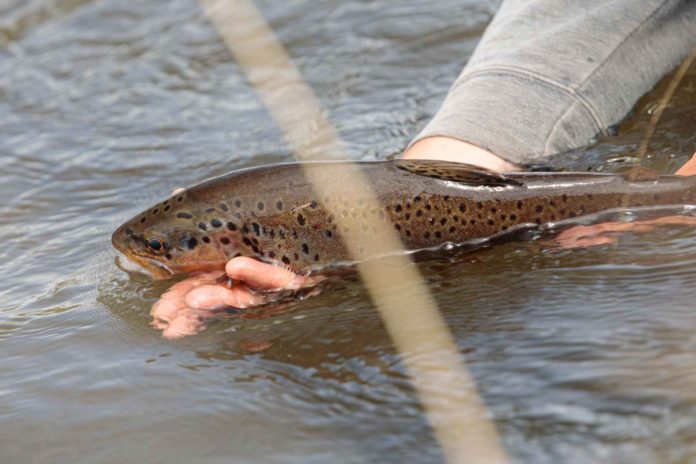I was engaged in a conversation recently about the methods used to catch trout on a fly, and I was particularly interested in how one angler — an accomplished long-rodder by all counts — espoused the virtues of keeping a low profile, using lighter tackle, small flies and miniscule tippets.
“That’s just how I catch fish,” he said, unapologetically. It’s likely, given the pressure put on public waters all across the U.S., that this angler had simply adapted to the angling he likes to do and settled on methods that worked for him, even if they may not work for the long-term benefit of the fish he pursues.
Certainly, we could agree that keeping a low profile while chasing big browns in a meandering spring creek is wise practice. I, too, like lighter rods when fishing in small water — it’s just easier to maneuver and shorter, more accurate casts are vital. And it’s clear we both share the same passion for fly fishing. For real, dedicated anglers, it’s a foundational element. Air. Food. Water. Fishing.
But, as time has passed and wisdom has slowly overtaken enthusiasm, I’ve come to realize that why we fly fish is a uniquely personal issue. The answer, I would suspect, is different for all of us. But how we fly fish? That’s something we must all be accountable for.
These days, if you fly fish for trout anywhere across the globe, you’re noticing some not-so-subtle changes. Spring snowmelt is often earlier than “normal,” and there’s usually less of it. Temperatures in even the cooler climes are warmer than what would be considered the usual. Water temperatures in the heat of summer are, on many of our beloved rivers, untenable for trout. Wildfires rage for months — in some trouty locations, the commonly recognized “fire season” can last all year long now, and the impacts of these blazes are significant to trout and their habitat. These environmental factors shouldn’t just be creeping into our angling morality — they should be breaking down our ethical double doors, grabbing us by our lapels and slapping us around.
And we should be responding. We should be acting and volunteering and spending some of our money to help conservation groups fight the good fight both on the ground and on the Hill. But the first thing we should do is practice a little introspection.
Most of us spend an outsized percentage of our financial resources — whether it’s a tank of $3.75-per-gallon gas for a blue-collar angler to reach trout water an hour from home or several thousand dollars for well-heeled sports to jet off to New Zealand — to experience the thrill of pulling trout around by their lips. As much as we might like to think that fly fishing is a higher calling, reality is a bit more revealing, especially when we’re kneeling in the stream trying desperately to remove a fly from the jaws of a trophy rainbow, only to realize that, in our haste to answer our Godly passion, we forgot to crimp the barb.
So, yes … introspection. This is going to look quite a bit different to each of us. But let’s start with this simple statement: The gear angler who catches and keeps a pair of trout is doing less harm than the fly fisher who spends an entire day, doesn’t harvest a fish, but returns to the lodge and happily declare that he managed to catch and release 43 trout.
It’s fine if you disagree. I only ask that you think about it, particularly in a time when the climate instruments are spinning on the dashboard, the red warning light is flashing, the alarm is blaring and we’re this close to an ecological “mayday!” Throw in other factors such as the use of lighter tippets, the time spent holding fish out of the water in order to capture that perfect hero shot and even the use of dry-dropper or multi-fly rigs under indicators to increase the catch rates, and I dare say that a little kid fishing with a worm and taking a few trout home for dinner is the ecological do-gooder when stacked up against a high-volume fly fisher.
I’ve tried for years to tactfully explain to many fellow anglers how 6x or 7x tippets are hard on trout. They extend the fight, disable the ability to bring fish to hand within a reasonable time frame and simply exhaust the fish. This was a lesson I learned almost 20 years ago when Bruce Staples, a well-known fly fisher here in eastern Idaho, told a group of anglers at our annual fly fishing and tying expo that his limit, even for small-water trout, is 3x. Anything smaller, he explained, is irresponsible. And, he said, if you really love to fish, then you need to really love the fish, and that means giving them every chance of surviving their near-death experience with you.
On a crystal-clear spring creek, where lighter tippet is perceived to be a necessity in order to fool a big, fat brown that might weigh 4 pounds, every hooked fish is going to require more time to land, more time to revive and more time to recover, assuming the fish doesn’t break off and spend the next two weeks swimming around with a size 22 Zebra Midge stuck in its mouth. And, even under the very best of catch-and-release practices in increasingly rare ideal conditions (cold water, healthy habitat, proper fish handling, etc.), between 4 and 6 percent of the fish we do land and then set free are going to die. And I’ve fished with enough avid, seasoned, well-intentioned, dedicated catch-and-release anglers who just don’t know how to handle a trout worth a damn. Ideal catch-and-release practices happen very rarely.
I keep coming back to introspection, because it’s clear after discussions with my fellow anglers that a lot of us just don’t realize the impacts we have on our fisheries. There’s an assumption that catching and releasing trout is all we need to do to meet our ethical obligations (and cleanse our consciences in the process). Reality is a little different. Lee Wulff’s famous declaration that a trout is too valuable to catch only once still rings true. But I might take it a bit farther. On some days and under some circumstances, trout are just too valuable to catch at all, especially when adverse conditions might increase the likelihood of its demise if it falls for your fly.
How we fish matters. And that’s just not debatable.
Credit: Source link































